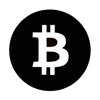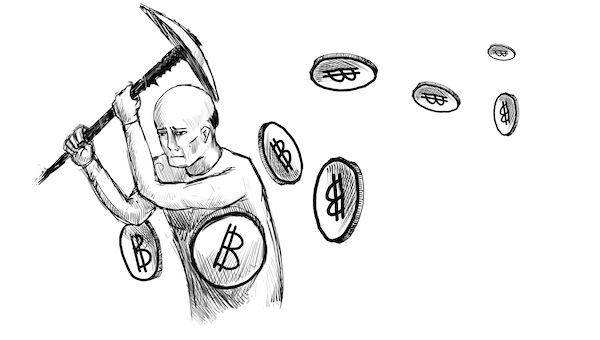Buying a hot chocolate the unconventional way, I approached the register at Palo Alto’s Coupa Cafe carrying no standard form of currency on me. Not a dollar bill nor coin, nor a credit or debit card, instead I sought to experiment with the latest technological hype to buzz ing through Palo Alto. A fraction of a bitcoin, one one hundredth to be exact, was all I carried in a “wallet” on my phone. As I saw the price for my Spicy Mayan Hot Chocolate come up at the register, a lime green number followed right beneath in bitcoins.
 “That will be 19 thousandths of a bitcoin,” said the woman standing behind the counter.
“That will be 19 thousandths of a bitcoin,” said the woman standing behind the counter.
I opened the blockchain application for the first time, entering the code for Coupa Cafe and entering the .019 payment. A miniature barcode popped up on my phone screen, which I held up for the register’s scanner to read. A satisfying beep alerted me that my payment had been processed. Within milliseconds, my payment had reached Coupa’s account.
Although Coupa Cafe currently is one of the few places that accept bitcoins, it represents just the beginning Bitcoins propagate.
In March of 2012, Gunn student Atanas Spasov purchased a number of bitcoins for a mere $5 each. Since then, Spasov’s investment rose a staggering 19,000 percent as during Bitcoin’s meteoric rise from unknown currency to the world’s most frequently traded cryptocurrency in that short space of time, as with the growth in accessibility and functionality came a rapid increase in price.
Bitcoin was created in early 2009 by a developer under the pseudonym Satoshi Nakamoto, who has sinced passed on his control of the project. According to multiple journalistic sources, Nakamoto’s identity is unknown but he holds billions of dollars worth of bitcoins. Unlike the currencies in our world today, Bitcoin has no ties with any country, has no known creator or operator and can be exchanged and used without any easily accessible record. Enormous amounts of anonymity are what fuel the growth and expansion of this virtual currency.
Bitcoin was able to gain popularity by verifying transactions without a central third party organization. The developers solved this by creating a complex algorithm for which purchases are tracked by a “block chain.” People called miners produce the blockchain and verify transactions. A miner is given 25 bitcoins if he is the first to verify the transaction. Miners are rewarded for assisting the network and this reward system is the method in which new bitcoins are introduced, says Google employee Mike Youseffmir, who developed a strong interest in Bitcoin in 2009.
Smith, a Palo Alto High School student whos name has been changed to protect his identity, was a miner three years ago. He mined for a three-month period and was rewarded with $100,000 profit on a $5000 investment.
“The real costs were the electricity to run my computer programs, and the cost of buying three computers with four graphics cards each,” Smith says, reflecting on his investment.
Smith found that mining was extremely rewarding in 2011 but he believes for the majority of miners now, the expenses exceed the scant reward.
“You don’t want to be in your garage when you are mining, because it is around 100 degrees in there,” Smith says. “Additionally, the systems are constantly crashing, and need to be fixed.”
The mining process consists of running code on a computer system. However, according to Smith, the code is publicly available, making the process more straightforward.
Smith stated that the production of bitcoins will cease once there are 20 million coins produced, preventing inflation.
Although many may express doubt in the currency’s ability to succeed due to the lack of clarity about its structure and creation, Paly senior and Bitcoin investor Max Bernstein disagrees.
“I like the anonymity and decentralization of Bitcoin,” Bernstein says.
Bernstein got involved in Bitcoin during his freshman year and he saw the bitcoins he saw his investment at $450 a coin rise to nearly $950 a coin.
Bitcoin’s colossal rise in popularity and value has resulted in a explosion of startups revolving around the new currency. Andres M. Antonopoulos, Bitcoin expert and entrepreneur, is currently involved in multiple projects involving uses of Bitcoin and believes that Bitcoin will continue to rise at this rapid rate.
“The amazing power of Bitcoin is that you have to trust no one,” Antonopoulos says.
Bitcoin is a decentralized currency, preventing it from being controlled by a particular government or organization. Additionally, the founder and creator of Bitcoin has no superior status as a user, Antonopoulos says that the creator has to play by the same rules as anybody else.
After seeing Bitcoin rise to prominence over the course of the last couple years, Bernstein, Spasov, and Paly alumnus Adrian D’Urso hold unique perspectives on Bitcoin’s prospects for the future.
According to Spasov, unlike regular currencies, the quantity of bitcoins does not expand or contract to demand. Spasov believes that the method in which the virtual currency functions is unlike that of a national currency.
“Bitcoin’s supply will bounce around wildly, preventing it from becoming a global currency,” Spasov says.
The National Bureau of Economic Research’s David Yermack echos Spasov’s perspective in a graph, which he believes summarizes Bitcoin’s inability to succeed. The graph shows that in 2013, Bitcoin had a volatility rate seven times that of gold, and nearly 21 times that of the British pound.
D’Urso shares a different perspective, believing that Bitcoin has the potential to spread across the globe.
“Bitcoin is to cash like email is to mail,” D’Urso says. He added that Bitcoin will eventually succeed cash in the fashion that email forced paper mail out.
Antonopoulous believes Bitcoin has the ability to make processes easier for nonprofits and schools.
“Schools currently have all their payments for lunches and student fees through paper and check because Paypal or systems like that are too expensive,” Antonopoulos says. With Bitcoin, schools would be able to transfer their payment system and would not pay the substantial 3.4 percent processing fee that Paypal charges.
He says that Bitcoin has the potential to become more accessible and useable than the cash money we use today, similar to how email eventually became the practical improvement over paper mail.
Antonopoulos is a great believer in the potential of Bitcoin and other cryptocurrencies to succeed, saying that in the future, even governments will adopt cryptocurrencies as their national currency, rather than trying to prevent their globalization.
“Bitcoin is an invention,” Antonopoulos says. “It’s math, you cannot stop it. Stopping it would be like trying to ban x2+6x+9.”



